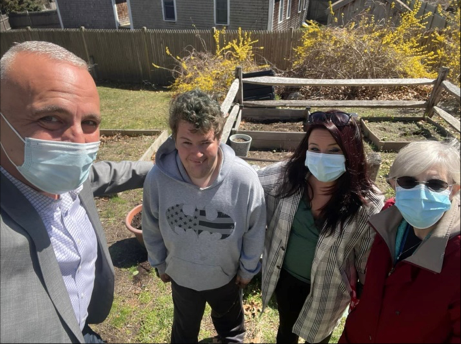Latham Centers CEO reacts to Massachusetts House leaders’ budget plan
April 21, 2022

Photo Caption: Community-based programs have advocated for increased government funding of a livable wage for direct care staff who support individuals with disabilities. The industry is now in a workforce crisis.
Latham President and CEO Anne McManus has not given up on her longtime fight for the government to value and appropriately compensate our direct care workers here in Massachusetts. Anne is asking for your help:
“PLEASE call your state representative and find out why the House did not support raising direct care starting wages above the current $16.79 per hour. The $50 billion state budget plan unveiled by House leaders last week fails to address our human services workforce crisis. Our community of providers was crushed to learn that the house budget included no provision to increase direct support professionals’ wages above what the Governor submitted in his budget. Throughout the Commonwealth, human services advocates requested $350M to raise the hourly wage for direct care. The budget is now in the hands of the Senate. Please join me in asking our leaders to bring the entry-level direct care pay rate to $20.30 per hour. Our government must prioritize our citizens with disabilities – and the staff who support them.” ~ Anne McManus
Background information:
The press release sent to local media by the Cape Cod Disability Network prior to the disappointing news about the House budget appears below. Please join the advocacy movement — the individuals we serve need your voice! Additional news and advocacy information is available from our trade association, ADDP: https://www.addp.org.
Press Release (April 12, 2022)
Non-Profits Serving Individuals with Disabilities Join to Advocate for Increased State Funding
More than 340 Cape Cod Disability Network community members met with Cape Cod and Plymouth legislators
REGIONAL — Four non-profit organizations serving people with disabilities throughout Southeastern Massachusetts and Cape Cod demonstrated the strength of their advocacy efforts in a 347-person virtual meeting with Cape and Plymouth legislators. Leaders of the Cape Cod Disability Network (CCDN), including Kim McElholm (Cape Abilities), David Botting (Community Connections), Anne McManus (Latham Centers), and Diane Enochs (Living Independently Forever / LIFE), implored legislators to commit to increased state funding for salaries and services for community-based programs supporting individuals with intellectual and developmental disabilities. In attendance and expressing support via Zoom on April 1st were State Senators Julian Cyr and Susan Moran, and State Representatives Kip Diggs, Sarah Peake, David Vieira, and Steven Xiarhos.
The Cape Cod Disability Network is advocating for the following increases in the Massachusetts Fiscal Year 2023 budget, in alliance with direct care providers across the Commonwealth:
● An additional $350 million to increase workforce salaries (approval would bring the entry-level Direct Care rate up to $20.30 per hour)
● $51 million for day habilitation and employment services to reflect 85% occupancy in these programs
● $9 million in transportation to ensure individuals are able to attend day habilitation programs
The Commonwealth of Massachusetts contracts with community-based organizations to provide services and supports to people with disabilities. Service providers are operating at drastically reduced capacities and long waiting lists due to the inability to attract and retain direct care staff. As a result, 7,000 citizens across Massachusetts are still not getting the safety net services they received before the pandemic, putting a strain on family members who must stay home to care for loved ones. The pandemic exacerbated the stress on dedicated essential staff who continue to work excessive hours due to vacancies. Prior to the COVID-19 pandemic, the field already had a direct care workforce shortage due to the lack of a livable wage. Human services organizations must compete with other industries paying a higher hourly wage for jobs that do not have the same life-changing (and lifesaving) impacts as serving people with disabilities. The competitive jobs also don’t require the extensive, highly skilled on-the-job training and certification required of direct care staff.
Cape Cod Disability Network leaders illustrated the urgency of increased funding and the need to fix the broken system of reimbursement. CCDN is one of several coalitions committed to advocating for critical issues for the people they serve (individuals with acquired brain injuries and individuals with intellectual and developmental disabilities, including autism), and for their essential employees (direct support professionals). During the Zoom meeting, Latham Centers Board member Jack Kelly talked about his son, Drew, who attends the day habilitation program at Community Connections in Yarmouth and lives in a Latham group residence. Jack is concerned about the wage gap for direct care workers and its impact on his son now and in the future. “What does this crisis mean for Drew? It means possibly he won’t have a place to live,” Kelly stated. “What does this crisis mean for my wife and me? It means that Drew, after all these years at Latham, could be back at home. My wife and I are in our seventies. We are also extremely concerned about Drew’s care once we are gone.”
Jean Boyle also addressed legislators in the virtual meeting about the need to increase wages for direct care staff. Jean spoke about her daughter, Judy, who has attended the day habilitation program at Community Connections in Mashpee but cannot return to the program yet because of the shortage of direct care staff. “Judy misses her friends. Her day program is her life and recently she told me that she feels as though she does not have a life right now. Judy feels hopeless and all our lives need hope,” Boyle said. “These employees at Community Connections care for Judy with such kindness, efficiency, and concern. But mostly, they are providing her with a life of friends and activities instead of isolation and misery.”
“There is a real human impact to the budget and policy decisions made by Massachusetts legislators which affects the people we all serve and their families,” said David Botting, President and CEO of Community Connections. “Appropriate funding for safety net services must do more than restore services to pre-pandemic levels; funding must be increased to sustain the delivery of these services in the future.”
###
About The Cape Cod Disability Network The Cape Cod Disability Network (CCDN) was established in 1996 and is comprised of nonprofit organizations on Cape Cod that provide services and supports for people with disabilities. The CCDN leverages its resources for collaboration on advocacy, fundraising, and training.

